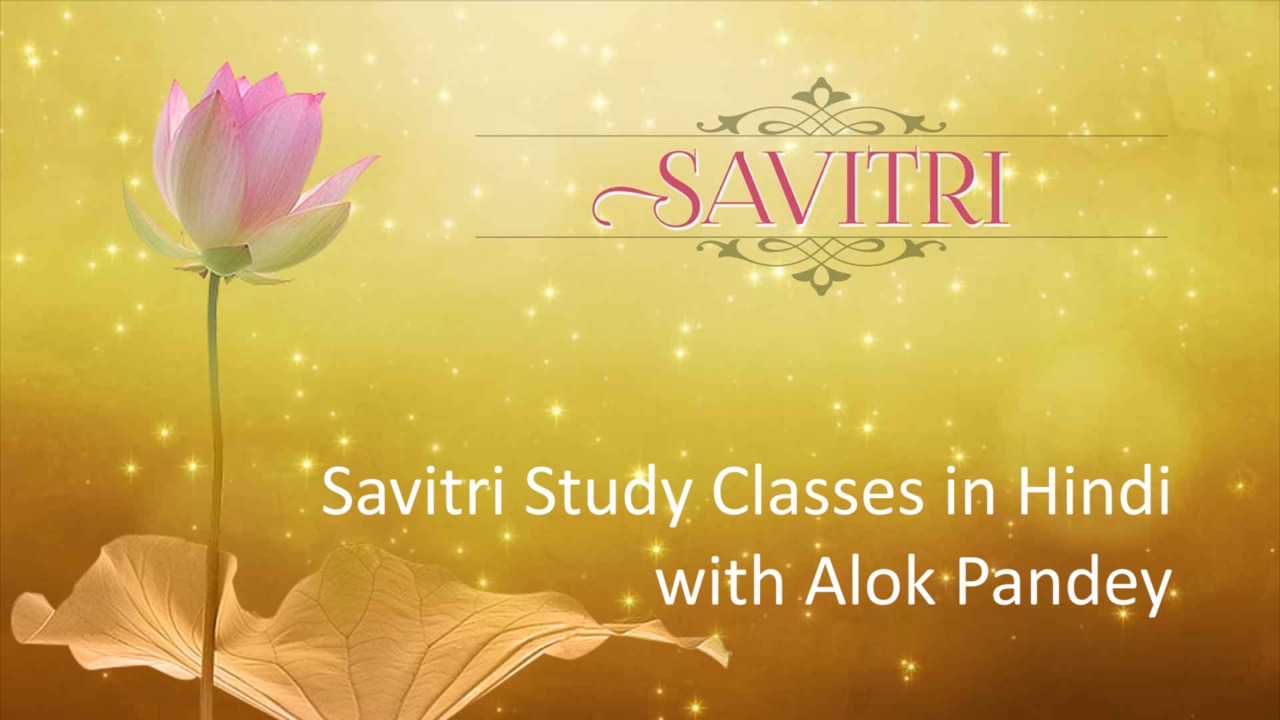Savitri Class in Hindi with Alok Pandey
Savitri Book Five: The Book of Love, Canto Three: Satyavan and Savitri
Satyavan invites Savitri, the golden bride, to descend from her chariot and enrich the floors of his earthly home.
Savitri briefly gives her own introduction and requests Satyavan to speak more about himself.
She is enchanted by his words even as Satyavan unveils his inner being bearing the stamp of an inner royalty.
Close is my father’s creepered hermitage
Screened by the tall ranks of these silent kings,
Sung to by voices of the hue-robed choirs
Whose chants repeat transcribed in music’s notes
The passionate coloured lettering of the boughs
And fill the hours with their melodious cry.
Amid the welcome-hum of many bees
Invade our honied kingdom of the woods;
There let me lead thee into an opulent life.
Bare, simple is the sylvan hermit-life;
Yet is it clad with the jewelry of earth.
Wild winds run—visitors midst the swaying tops,
Through the calm days heaven’s sentinels of peace
Couched on a purple robe of sky above
Look down on a rich secrecy and hush
And the chambered nuptial waters chant within.
Enormous, whispering, many-formed around
High forest gods have taken in their arms
The human hour, a guest of their centuried pomps.
Apparelled are the morns in gold and green,
Sunlight and shadow tapestry the walls
To make a resting chamber fit for thee.”Awhile she paused as if hearing still his voice,
Unwilling to break the charm, then slowly spoke.
Musing she answered, “I am Savitri,
Princess of Madra. Who art thou? What name
Musical on earth expresses thee to men?
What trunk of kings watered by fortunate streams
Has flowered at last upon one happy branch?
Why is thy dwelling in the pathless wood
Far from the deeds thy glorious youth demands,
Haunt of the anchorites and earth’s wilder broods,
Where only with thy witness self thou roamst
In Nature’s green unhuman loneliness
Surrounded by enormous silences
And the blind murmur of primaeval calms?”And Satyavan replied to Savitri:
“In days when yet his sight looked clear on life,
King Dyumatsena once, the Shalwa, reigned
Through all the tract which from behind these tops
Passing its days of emerald delight
In trusting converse with the traveller winds
Turns, looking back towards the southern heavens,
And leans its flank upon the musing hills.
But equal Fate removed her covering hand.
A living night enclosed the strong man’s paths,
Heaven’s brilliant gods recalled their careless gifts,
Took from blank eyes their glad and helping ray
And led the uncertain goddess from his side.
Outcast from empire of the outer light,
Lost to the comradeship of seeing men,
He sojourns in two solitudes, within
And in the solemn rustle of the woods.
Son of that king, I, Satyavan, have lived
Contented, for not yet of thee aware,
In my high-peopled loneliness of spirit
And this huge vital murmur kin to me,
Nursed by the vastness, pupil of solitude.
Great Nature came to her recovered child;
I reigned in a kingdom of a nobler kind
Than men can build upon dull Matter’s soil;
I met the frankness of the primal earth,
I enjoyed the intimacy of infant God.
In the great tapestried chambers of her state,
Free in her boundless palace I have dwelt
Indulged by the warm mother of us all,
Reared with my natural brothers in her house.
I lay in the wide bare embrace of heaven,
The sunlight’s radiant blessing clasped my brow,
The moonbeams’ silver ecstasy at night
Kissed my dim lids to sleep. Earth’s morns were mine;
Lured by faint murmurings with the green-robed hours
I wandered lost in woods, prone to the voice
Of winds and waters, partner of the sun’s joy,
A listener to the universal speech:
My spirit satisfied within me knew
Godlike our birthright, luxuried our life
Whose close belongings are the earth and skies.[Savitri: 402 – 404]
(line breaks are added to emphasize separate movements)




About Savitri | B1C1-09 Advent of the Divine Mother (p.4)